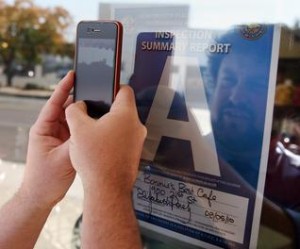One busy evening at the Flatiron Room on West 26th Street, a man walked in and announced to a restaurant’s staff that he was there to do a health inspection.
He surveyed every corner of the restaurant, from liquor bottles to egg cartons, and c hecked the temperature of refrigerators and dishes on the line.
hecked the temperature of refrigerators and dishes on the line.
The man, though, according to the Wall Street Journal, wasn’t a city Health Department inspector whose report determines the letter grade plastered in a restaurant’s windows. He was a restaurant consultant performing a mock inspection so that the eatery would be ready for the real thing.
Flatiron Room owner Tommy Tardie has an inspector from Letter Grade Consulting come once a month because he believes a lot rides on what grade his year-old restaurant gets.
“I’m guilty of it. I definitely use [letter grades] as a deciding factor,” said Mr. Tardie, whose restaurant has an A and has been using the consultants for four months. “If I’m walking somewhere and I’m looking for a quick bite to eat, and one is a B and one is an A. It’s a no brainer. I’m going to go to the A.”
The New York City public grade program was introduced in 2010, and in early 2012, the Health Department introduced a smartphone application, which searches all 24,000 restaurants it inspects for letter grades, scores, and all health violations. The app has been downloaded 44,000 times, according to the Health Department.
The business review site Yelp plans to shine even more light on the process by introducing inspection results along with reviews in New York City.
The pressure to pass the inspections leads restaurant owners to seek out restaurant consultants, who can charge $250 for a one-time mock inspection or thousands of dollars for yearly contracts with larger restaurants—including representation at hearings where violations can be contested.
At the Pad Restaurant in Topeka, Kansas, cleaning the walls is a family tradition. Scrubbing down table legs is a rite of passage.
Cleanliness, co-owner Troy Mentzer said, is one of the founding principles of the family business, dating back to when his father started it in 1973.
Last year, the restaurant had just three food safety violations. As such, it ranks among 39 Shawnee County restaurants to boast no more than three violations and no follow up visits  in all of 2013.
in all of 2013.
For the Pad, that is a complete turnaround from 2012. That year, the restaurant had 31 total violations, earning a place among the county’s worst 20 restaurants for violations.
Mentzer credited the shift to listening to state inspectors, offering consistent food safety training to managers and staff, and a new internal inspection schedule.
“Two years ago, we took a hit and had some violations,” he said. “Now, we self-inspect weekly.”
